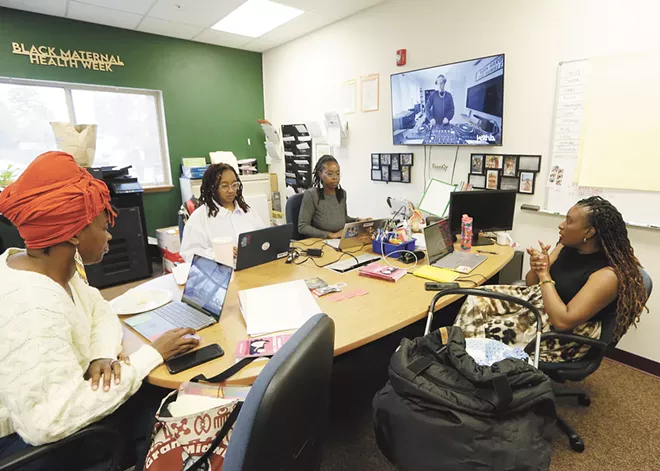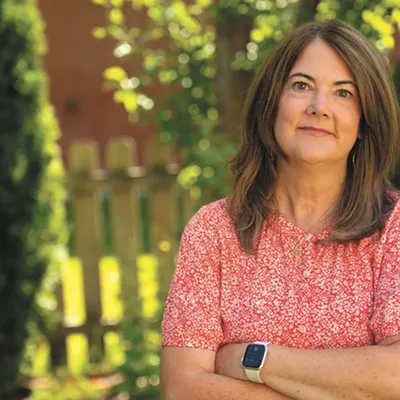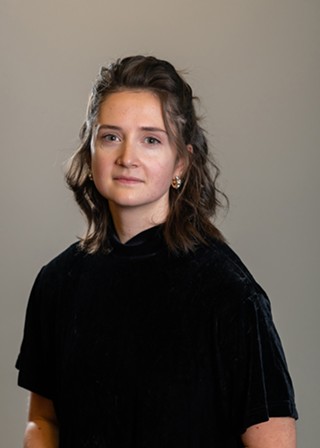So far, she's created the Learning Project Network. She's created the Shades of Motherhood Network. She's created the guidebook Our Community: Black Leaders in Spokane. And she's got more ideas on the way.
Courtney is a local educator pursuing justice for Black and brown women — and their children — in maternal health and early childhood education circles.
"Our goal is to create projects that create social and humanitarian change," Courtney says.
Courtney has lived in Spokane for 15 years, arriving when her parents first moved the family to the Northwest to serve at Fairchild Air Force Base. She earned a master's degree in education from Whitworth University and started working in early childhood development.
As she worked, Courtney noticed a lack of culturally diverse educators and resources for early learners. So in 2015 she created the Learning Project Network, a flexible nonprofit mostly focused on pop-up training for teachers.
"The Learning Project really started focusing on multicultural education, social justice, mental health, and most importantly, creative ways to build representation and development in the classroom," Courtney says.
Her next idea came from a teacher in one of those pop-ups.
"I was working with some early childhood educators during Black History Month, and one of the teachers was like, 'Stephaine, I'm really embarrassed to say this, but I really don't know any Black people,'" Courtney says. "I said, 'There is no need to be embarrassed.'"
Courtney set to work compiling a guidebook to current Black leaders in Spokane. The collection of biographies featuring people like Stephy Nobles-Beans, Kitara Johnson, and Sandy Williams was eventually titled Our Community: Black Leaders in Spokane.
For many on the list, it was "the first time they saw themselves visible in the community that they loved and they were investing in," Courtney says. "One of the people in the book said, 'I read this to my daughter and she was like, 'That's my mom.' I am very big about legacy... I was raised around women who came from nothing and wanted to give the community everything."

But while she was trying to fill gaps in her community, Courtney was facing an immense sense of loss of her own. She had dreamed of having a family, but doctors couldn't diagnose why she repeatedly miscarried. After dealing with fertility issues for seven years, she finally had her first child, Jaliyah, three years ago.
Courtney's struggle brought her to one of the quotes she now lives by.
"When a mother has a child, it's time for the mother to be mothered," she recites.
Through her own experience, Courtney started learning about the maternal health issues facing Black and brown women across the country. Maternal mortality is four times higher for Black women, according to research published in the World Journal for Gynecology & Women's Health.
Some of that can be traced to lack of education and resources, Courtney says. One grassroots way to address that lack of education while building community is to train up a network of culturally savvy doulas.
"A doula is an individual who provides emotional and physical support," Courtney says. "They are really the people that help direct someone to one-on-one resources such as counseling or peer support groups."
A doula can help a new mother understand what's a normal experience during pregnancy versus what requires medical attention. They can advocate for an exhausted woman in a delivery room or connect new mothers to supportive peer groups.
Courtney developed the Shades of Motherhood Network to train doulas and build a platform to talk about maternal health issues. They create art exhibits to display in local hospitals during April's maternal health week to inform the community about the unique needs of women of color.
According to the National Vital Statistics from the Centers for Disease Control, Black infants are twice as likely as white infants to have low birth weights, and about 5% more likely to be born preterm. Lack of adequate prenatal care, especially in the third trimester, increases the risk for low birthweight and premature delivery, which in turn increases the risk of neurological, gastrointestinal and breathing issues for the baby.
For Black mothers, "we've really normalized pain in the body," Courtney says. "History shows there's spaces where they believe that Black people have a higher pain tolerance, so Black women specifically are not getting the same pain management or the same referrals that their white counterpart might get...We really need to look at this from a systems perspective and say, 'What in the system is preventing a person from asking or receiving support and help? How can we change that?'"
As Courtney's concerns continue to evolve with her life experiences, one thing remains constant: She hopes her work prods the community to have the courage to challenge the status quo.
"We need more people to see something that disturbs them so much that they can't get it out their mind and they say, 'What can I do?'"





















